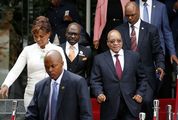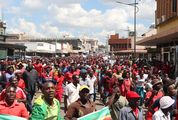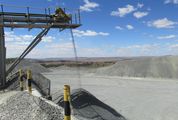Source:

BUSINESS DAY TV: A combination of factors is keeping the lights on
by Transcript service,
2016-02-05 14:39:57.0
BRIAN Molefe is the CEO of Eskom.
BUSINESS DAY TV: In the midst of public hearings into whether Eskom will be allowed to hike tariffs to recoup money spent on diesel last year, the utility today delivered a more upbeat assessment on its power delivery abilities promising no load shedding heading into winter. Joining us on the line is CEO Brian Molefe.
Brian ... so to what extent is what you’ve put out there today speaking more so to the low demand scenario than anything else?
BRIAN MOLEFE: Actually the reason we’re not having load shedding is not as a result of the single factor. Demand obviously is one of the factors but also the way that we’re doing maintenance, the increased reliability of our fleet contribute as well as the disciplined manner in which we are managing the fleet. So it is quite a number of factors that has resulted in us not having load shedding. And you’ll remember that we are probably the only company in SA at the moment that is telling consumers to use less of our product, which is electricity. So every power alert which we issue says please use less electricity and that has somehow borne through as well and that has helped in bringing the demand down. But yes, there are quite a number of factors that have resulted in us not having load shedding.
BDTV: It’s obviously also a factor of a weak economy and an increasingly weak economy. Were things to turn around though, and if you were to see maybe an uptick in mining and manufacturing, would that then put the supply-demand balance into a much tighter spot?
BM: Yes, it might, but you must also remember that we have quite a lot of infrastructure projects in the pipeline ... Medupi, Kusile and Ingula are in the pipeline and in fact we expect the first unit of Ingula to be synchronised and on load sometime in 2017. And just from Ingula alone, it’s about 1500MW. Medupi Unit 5 will come online in 2018 and after Unit 5 of Medupi there will also be some Kusile units as well as the rest of Medupi. So from the pipeline of projects we should be able to keep up with demand when the economic situation turns around.
BDTV: Having said that, what would need to go wrong to revert back to load shedding?
BM: If suddenly on a day like this a lot of units suddenly packed up and we are not able to respond quickly enough to the UCLF which is the unplanned maintenance then that could cause load shedding, but at the moment we seem to be managing the fleet quite tightly and very successfully.
BDTV: You’ve said a lot of things about load shedding today and we’ve picked up something that was said in the conference this afternoon that you believe that Glencore has deliberately tried to cause load shedding in SA in a failed effort to achieve massive coal price increases. Firstly, that’s a pretty inflammatory thing to say.
BM: I was just talking about my feelings and I said that I felt when at the time when we were negotiating with Glencore that there was a little of bad faith on their part because they said that they wanted to increase the price and they would like us to increase the price at which they were buying coal from us from R150-R500 odd and when we said that we cannot afford it, they said well it’s going to cause a lot of load shedding....
BDTV: How much more favourable pricing structures are you currently looking at with the short-term suppliers you now have on board, one of them being Tegeta?
BM: And Glencore is a short-term supplier. By the way Tegeta is not a short-term supplier at Arnot, it’s still Glencore because the transaction has not gone through.
BDTV: Okay, but going to previous questions about what kind of pricing you’re getting from the short-term suppliers that you have, what has happened to prices?
BM: In Arnot, for example, Exxaro wanted to renew the price of a contract in which we were paying R900/kWh and we refused to do that and got calls from short-term suppliers at an average of about R400/kW and in fact some of the suppliers have been supplying at about R180/kW and R132/kW and some of them just over R400/kW. Glencore itself is providing us with coal at Arnot at the moment at about R406/kW.
BDTV: So how are you ensuring right now that you don’t get locked into unfavourable supply agreements again, just how much power do you have or negotiating muscle do you boast right now?
BM: The problem that we had in the past actually was the coal cost plus mines where we’d (woven) ourselves into the capital requirements of the mines and we have said in the past that we are going to move away from these cost plus contracts. What we’re going to do is introduce more competition in the market in the way that we procure coal. So what we’ll do is have a tender for the supply of coal to a particular power station, and irrespective of where the mine is we will then buy from the mine that gives us the relative cheap price and the quality that we require. So without being bound to particular mines because we had agreed to put capital into the mines.
BDTV: One last question, you cut off, or wanted to cut off five municipalities in the Northern Cape ... there’s an order that was granted by the Gauteng High Court against that order, so what now and what action are you taking against other defaulting municipalities like Soweto?
BM: Actually, that was not an order, it was not an interdict at all. What the judge said was that he would give Eskom an opportunity to file papers opposing the interdict so we were supposed to file the papers and then the judge said, while we are preparing the papers to be filed in court, we should not implement any cuts and so this order was given on Friday. The papers were filed today and so there is no interdict and technically we can cut off the municipalities’ power, but instead we have chosen to speak to the municipalities and we are negotiating at the moment. We will be opposing the intended interdict ... it’s not an interdict. It’s reported that there’s an interdict but it’s just that the judge said, don’t cut them off until you have filed your papers opposing the action.
BDTV: But just on that point, why take action against Northern Cape municipalities and not against your largest debtor, the entity that owes you the most money, being Soweto?
BM: We are in the process of implementing prepaid meters in Soweto and we think that will mitigate against further increases in the debt in Soweto and in the case of Soweto, it’s the individual houses that owe us money while in the Northern Cape, it is actually the municipalities to which we supply in bulk. In the case of Soweto we have switched off households that owe us money ... we do switch them off regularly for arrears debt. But the long-term solution in Soweto is really to have prepaid meters and we are actively involved in Soweto at the moment, trying to put in prepaid meters.
BRIAN Molefe is the CEO of Eskom.
BUSINESS DAY TV: In the midst of public hearings into whether Eskom will be allowed to hike tariffs to recoup money spent on diesel last year, the utility today delivered a more upbeat assessment on its power delivery abilities promising no load shedding heading into winter. Joining us on the line is CEO Brian Molefe.
Brian ... so to what extent is what you’ve put out there today speaking more so to the low demand scenario than anything else?
BRIAN MOLEFE: Actually the reason we’re not having load shedding is not as a result of the single factor. Demand obviously is one of the factors but also the way that we’re doing maintenance, the increased reliability of our fleet contribute as well as the disciplined manner in which we are managing the fleet. So it is quite a number of factors that has resulted in us not having load shedding. And you’ll remember that we are probably the only company in SA at the moment that is telling consumers to use less of our product, which is electricity. So every power alert which we issue says please use less electricity and that has somehow borne through as well and that has helped in bringing the demand down. But yes, there are quite a number of factors that have resulted in us not having load shedding.
BDTV: It’s obviously also a factor of a weak economy and an increasingly weak economy. Were things to turn around though, and if you were to see maybe an uptick in mining and manufacturing, would that then put the supply-demand balance into a much tighter spot?
BM: Yes, it might, but you must also remember that we have quite a lot of infrastructure projects in the pipeline ... Medupi, Kusile and Ingula are in the pipeline and in fact we expect the first unit of Ingula to be synchronised and on load sometime in 2017. And just from Ingula alone, it’s about 1500MW. Medupi Unit 5 will come online in 2018 and after Unit 5 of Medupi there will also be some Kusile units as well as the rest of Medupi. So from the pipeline of projects we should be able to keep up with demand when the economic situation turns around.
BDTV: Having said that, what would need to go wrong to revert back to load shedding?
BM: If suddenly on a day like this a lot of units suddenly packed up and we are not able to respond quickly enough to the UCLF which is the unplanned maintenance then that could cause load shedding, but at the moment we seem to be managing the fleet quite tightly and very successfully.
BDTV: You’ve said a lot of things about load shedding today and we’ve picked up something that was said in the conference this afternoon that you believe that Glencore has deliberately tried to cause load shedding in SA in a failed effort to achieve massive coal price increases. Firstly, that’s a pretty inflammatory thing to say.
BM: I was just talking about my feelings and I said that I felt when at the time when we were negotiating with Glencore that there was a little of bad faith on their part because they said that they wanted to increase the price and they would like us to increase the price at which they were buying coal from us from R150-R500 odd and when we said that we cannot afford it, they said well it’s going to cause a lot of load shedding....
BDTV: How much more favourable pricing structures are you currently looking at with the short-term suppliers you now have on board, one of them being Tegeta?
BM: And Glencore is a short-term supplier. By the way Tegeta is not a short-term supplier at Arnot, it’s still Glencore because the transaction has not gone through.
BDTV: Okay, but going to previous questions about what kind of pricing you’re getting from the short-term suppliers that you have, what has happened to prices?
BM: In Arnot, for example, Exxaro wanted to renew the price of a contract in which we were paying R900/kWh and we refused to do that and got calls from short-term suppliers at an average of about R400/kW and in fact some of the suppliers have been supplying at about R180/kW and R132/kW and some of them just over R400/kW. Glencore itself is providing us with coal at Arnot at the moment at about R406/kW.
BDTV: So how are you ensuring right now that you don’t get locked into unfavourable supply agreements again, just how much power do you have or negotiating muscle do you boast right now?
BM: The problem that we had in the past actually was the coal cost plus mines where we’d (woven) ourselves into the capital requirements of the mines and we have said in the past that we are going to move away from these cost plus contracts. What we’re going to do is introduce more competition in the market in the way that we procure coal. So what we’ll do is have a tender for the supply of coal to a particular power station, and irrespective of where the mine is we will then buy from the mine that gives us the relative cheap price and the quality that we require. So without being bound to particular mines because we had agreed to put capital into the mines.
BDTV: One last question, you cut off, or wanted to cut off five municipalities in the Northern Cape ... there’s an order that was granted by the Gauteng High Court against that order, so what now and what action are you taking against other defaulting municipalities like Soweto?
BM: Actually, that was not an order, it was not an interdict at all. What the judge said was that he would give Eskom an opportunity to file papers opposing the interdict so we were supposed to file the papers and then the judge said, while we are preparing the papers to be filed in court, we should not implement any cuts and so this order was given on Friday. The papers were filed today and so there is no interdict and technically we can cut off the municipalities’ power, but instead we have chosen to speak to the municipalities and we are negotiating at the moment. We will be opposing the intended interdict ... it’s not an interdict. It’s reported that there’s an interdict but it’s just that the judge said, don’t cut them off until you have filed your papers opposing the action.
BDTV: But just on that point, why take action against Northern Cape municipalities and not against your largest debtor, the entity that owes you the most money, being Soweto?
BM: We are in the process of implementing prepaid meters in Soweto and we think that will mitigate against further increases in the debt in Soweto and in the case of Soweto, it’s the individual houses that owe us money while in the Northern Cape, it is actually the municipalities to which we supply in bulk. In the case of Soweto we have switched off households that owe us money ... we do switch them off regularly for arrears debt. But the long-term solution in Soweto is really to have prepaid meters and we are actively involved in Soweto at the moment, trying to put in prepaid meters.




















Login OR Join up TO COMMENT